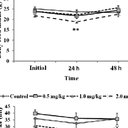Effects of glucagon-like peptide-1(7-36) amide on neurohypophysial and cardiovascular functions under hypo- or normotensive hypovolaemia in the rat.
Keywords
Coimriú
To date, glucagon-like peptide 1(7-36) amide (tGLP-1) has been found to affect the neurohypophysial and cardiovascular functions in normotensive and normovolaemic rats. The aim of the present study was to investigate possible effects of tGLP-1 on the mean arterial blood pressure and the release of vasopressin and oxytocin under conditions of blood volume depletion in the rat. In the first series of experiments, the animals were injected i.p. with either 0.15 M saline or 30% polyethylene glycol (PEG). PEG caused an 18% reduction of blood volume 1 h after injection. No significant changes in the mean arterial blood pressure were found in either normo- or hypovolaemic rats during the experiment. tGLP-1 injected i.c.v. at a dose of 1 microg/5 microl 1 h after the i.p. injection increased similarly the arterial blood pressure in normo- and hypovolaemic rats. The plasma vasopressin/oxytocin concentrations were markedly elevated in hypovolaemic animals and tGLP-1 further augmented the release of both hormones. In the second study, hypovolaemia was induced by double blood withdrawal. The haemorrhage resulted in a marked decrease of the mean arterial blood pressure and in the elevated plasma vasopressin/oxytocin concentrations. tGLP-1 injected immediately after the second blood withdrawal increased the arterial blood pressure. In parallel, tGLP-1 enhanced significantly vasopressin and oxytocin secretion when compared with haemorrhaged, saline-injected rats. The results of this study indicate that tGLP-1 may affect the arterial blood pressure and the secretion of neurohypophysial hormones under pathological conditions brought about by blood volume depletion.


